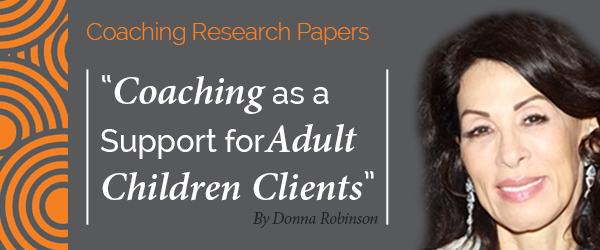Research Paper By Donna Robinson
(Relationship & Life Coach, UNITED STATES)
Members of Alcoholic Family systems, namely Adult children of Alcoholics, typically exhibit patterns, traits and behaviors that, although distinctly different from those of the alcoholic, are no less challenging to a satisfactory and successful life. In Adult Children, Alcoholic/Dysfunctional Families ACOA World Services Organization indicates that denial and defense mechanisms in adult children of alcoholics can be difficult to overcome resulting in lifelong patterns of unhappiness and the inability to move forward. Alcoholics, as well as being victims themselves have an adverse impact on those with whom they associate.
In her book Adult Children of Alcoholics, Janet Woititz, Ed.D, identifies how adult children display common characteristics that can impact their relationships and leave them feeling stuck for the rest of their lives unless they seek help to move forward. A life coach can use power tools to support recovering adult children in overcoming self-defeating patterns by reframing perspectives.
I. Alcoholic Family Systems and Patterns of Disease
Alcoholism is a family disease. Compulsive drinking affects the drinker and it affects the drinker’s relationships. Friendships, employment, childhood, parenthood, love affairs, and marriages all suffer from the affects of alcoholism. Those special relationships in which a person is really close to an alcoholic are affected the most, and those who care are the most caught up in the behavior of another person. 1
Over the last 25 years, research and clinical practice have verified the detrimental effects of growing up in a traumatic and hurtful family. 2
A. Adult Children
The term “adult child” does not mean that the individual lives in the past or that they are infantile in their thinking and actions. The term means that they meet the demands of adult life with survival techniques learned as children. It also means
that when confronted, they regress to a stage in their childhood.
Before finding recovery, adult children suppress their feelings and are overly responsible. They try to anticipate the needs of others and meet those needs so that they will not be abandoned. They try to be flexible or supportive of others as they deny their own needs. They monitor their relationships for any sign of disapproval. They try to be perfect so they will be loved and never left alone. Or, they isolate themselves and think they need no one. Often, the family unspoken rules become: don’t talk, don’t trust, and don’t feel. This is denial.
Understanding the ideas stated in Adult Children of Alcoholics and The Twelve Steps of Adult Children, one could summarize that 12 traits are continued into adulthood.
Adult Children:
These traits are not limited to the adult children of alcoholics. They can apply to those from a dysfunctional environment where alcohol is absent.
For example, children who grew up with parents who were addicted to any of the following: gambling, drugs, spending, over-eating, anorexia, bulimia, sex addiction or any obsessive- compulsive disorders. They are also present in adult children who were abused through the inappropriate use of intellect, manipulation, or silence.
